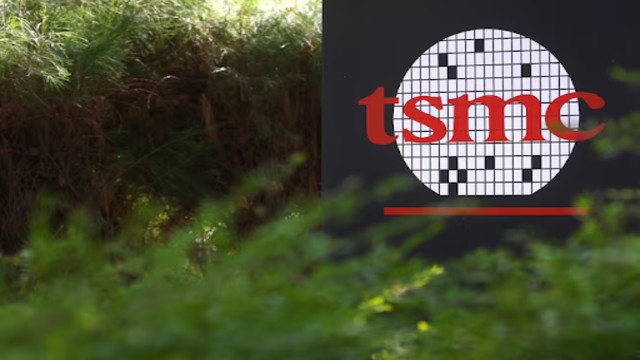
The logo of Taiwan Semiconductor Manufacturing Co. (TSMC) is displayed at the company's headquarters in Hsinchu, Taiwan, on January 19, 2021. Reuters
Taiwan Semiconductor Manufacturing Co. (TSMC) has reached a significant milestone in the semiconductor industry by beginning production of advanced four-nanometer chips in its newly opened facility in Phoenix, Arizona. This achievement marks a major step forward in U.S. efforts to strengthen its position in semiconductor manufacturing. U.S. Commerce Secretary Gina Raimondo shared the news with Reuters, highlighting how this development is part of the Biden administration's broader push to bring cutting-edge chip production to American soil.
For the first time in U.S. history, four-nanometer chips are now being made domestically, and the quality and yield are reportedly on par with those produced in Taiwan. "For the first time ever in our country's history, we are making leading edge four-nanometer chips on American soil, with American workers — on par in yield and quality with Taiwan," Raimondo said. She emphasized how this success defies previous skepticism, adding that "lots of people said it couldn’t happen," but the project has now come to fruition.
The new TSMC plant in Arizona is part of a larger U.S. initiative to boost semiconductor production, following the announcement of a $6.6 billion grant from the U.S. Commerce Department to TSMC's U.S. unit. This grant was finalized in November and aims to support TSMC's expansion in the U.S. The company is already planning significant further investments, with TSMC committing to invest $65 billion by 2030 in its Arizona operations, including the construction of a third semiconductor fab in the state. This move is part of the company’s broader strategy to expand its footprint and contribute to the U.S. semiconductor supply chain.
In addition to the production of four-nanometer chips, TSMC has also committed to producing even more advanced two-nanometer chips at its second Arizona fab, which is expected to start operations in 2028. Furthermore, TSMC will be using its most advanced manufacturing technology, known as "A16," in its Arizona facilities. The U.S. government has further incentivized TSMC's expansion by providing up to $5 billion in low-interest loans as part of the funding package.
The creation of this U.S.-based manufacturing capacity is a critical step toward the goal of making the U.S. a global leader in semiconductor production. Raimondo has set an ambitious target for the U.S. to produce 20% of the world's leading-edge logic chips by 2030, up from the current share of 0%. This initiative is backed by the semiconductor manufacturing and research subsidy program established by Congress in 2022, which aims to incentivize firms like TSMC to establish production facilities in the U.S.
In another significant move, Commerce also finalized a $407 million award to help fund Amkor Technology’s advanced semiconductor packaging facility in Arizona, which will be the largest of its kind in the country. This facility will play a crucial role in packaging and testing chips used in autonomous vehicles, 5G/6G technology, and data centers. Amkor's plant will work closely with TSMC’s Arizona facility, with Apple being the first and largest customer for the chips produced there.
With these developments, the U.S. is taking major strides toward securing its position in the semiconductor industry and ensuring a more self-reliant and secure supply chain for essential technology.















